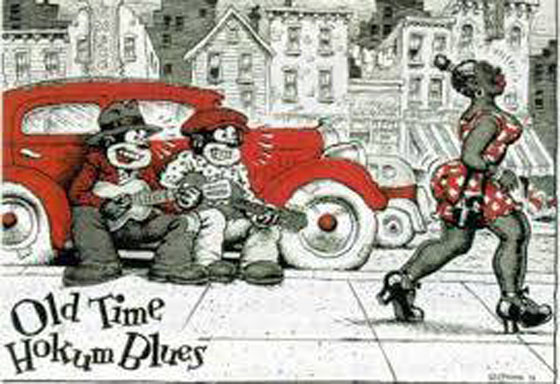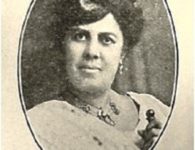By the 1970s black moviegoers had tired of cinematic portrayals of blacks as Mammies, Toms, Tragic Mulattoes, and Picaninnies. In the 1970s blacks willingly, though unwittingly, exchanged the old negative caricatures for new ones: Brutes, Bucks, and Jezebels. These new caricatures were popularized by the two hundred mostly B-grade films now labeled blaxploitation movies.
The portrayal of black women as lascivious by nature is an enduring stereotype. The descriptive words associated with this stereotype are singular in their focus: seductive, alluring, worldly, beguiling, tempting, and lewd. Historically, white women, as a category, were portrayed as models of self-respect, self-control, and modesty – even sexual purity, but black women were often portrayed as innately promiscuous, even predatory. This depiction of black women is signified by the name Jezebel.
In the 1915 movie The Birth of a Nation (Griffith), Lydia Brown is a mulatto character. She is the mistress of the white character Senator Stoneman. Lydia is savage, corrupt, and lascivious. She is portrayed as overtly sexual, and she uses her “feminine wiles” to deceive the formerly good white man. Lydia’s characterization was rare in early American cinema. There was a scattering of black “loose women” and “fallen women” on the big screen, but it would be another half century before the depiction of cinematic black women as sexually promiscuous would become commonplace.
These movies supposedly depicted realistic black experiences; however, many were produced and directed by whites. Daniel J. Leab (1976), the movie historian, noted, “Whites packaged, financed, and sold these films, and they received the bulk of the big money”(p. 259). The world depicted in blaxploitation movies included corrupt police and politicians, pimps, drug dealers, violent criminals, prostitutes, and whores. In the main, these movies were low-budget, formulaic interpretations of black life by white producers, directors, and distributors. Black actors and actresses, many unable to find work in mainstream movies, found work in blaxploitation movies. Black patrons supported these movies because they showed blacks fighting the “white establishment,” resisting police corruption, acting assertively, and having sex lives.
The film which ushered in the blaxploitation period was Sweet Sweetback’s Baadasssss Song (Gross, Van Peebles & Van Peebles, 1971), written, directed, produced, and starred in by Melvin Van Peebles. The story centers on Sweet, an amoral and hedonistic hustler and pimp, who kills two white cops who were attacking a young black radical. He spends the rest of the movie on the lam, running from racist cops and to pimps, gangsters, bikers, and whores. Sweet’s “revolutionary consciousness” is heightened because of his first hand experience with police corruption, and by the movie’s end he has become a heroic, almost mythical, black revolutionary. The film ended with the message: “A BAADASSSSS NIGG@R IS COMING BACK TO COLLECT SOME DUES.”
Sweet Sweetback’s Baadasssss Song was originally rated X. After decades of asexual and desexualized black Tom characters, black audiences were ready for a sexually assertive black male movie character. Sweet was reared in a brothel. In one flashback scene, a ten-year-old Sweet (played by Van Peebles’ real life son, Mario) is graphically taught how to make love by an older prostitute. Sweetback is slang for “large penis” and “great lovemaking ability.” Much of the movie centers on Sweet’s lovemaking abilities, and this movie helped promote the “black sex machine” characterization of black men common in later movies. Sweet Sweetback’s Baadasssss Song also gave impetus to cinematic portrayals of black women as Jezebel whores. According to Donald Bogle (1994), a film historian:





















5 Comments
An intriguing discussion is worth comment. I do believe
that you should publish more about this subject, it may not
be a taboo subject but typically people don’t discuss such topics.
To the next! Cheers!!
Hi friends, fastidious article and good urging commented here, I am actually enjoying by these.
Viagra Tarif Pharmacie online pharmacy Cialis 5 Mg Alcohol Cheap Cialis
If we are going to publish taboo subjects and articles about Black people we should do a complete publication. Why not talk about the positives as well as the negatives of our lives and not dwell too much on the negatives? We can extract lots of positive actions by our Black brothers and sisters even during slavery. People may not believe it but Blacks made this country with their hard work, intelligence and mental preseverance. We must be aware that 20% of the farming in this country, despite the fact that most was by sharecropping, was done by Blacks during the early 1900’s. Talk about how they survived and yet raise a great family. Please lets tell the wholesome story so we can learn and make better decisions on our daily lives. There is some much great information our our people and it will take more than a lifetime to learn………so much to learn!
There has been a trend over the last 40 years or so, to shed light on the destitution and despair we been endured in this country. When in the segregated schools of Washington, DC Negro History focused on those who succeeded and contributed in spite of obstruction…there was little mention of the debasement caused by slavery. The in the 1960s the focus switched to slavery and depictions of that experience. I think that back then, those in charge were closer to that experience; and as in any devastating experience, the closer you are to it, sometimes, you don’t discuss it…like many of those who survived the Nazi generated Holocaust…those survivors took a while before talking about it. I agree there needs to be a balance when we speak to our life experiences..it just takes time.